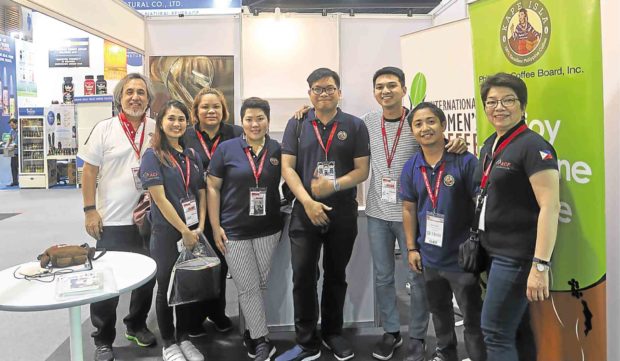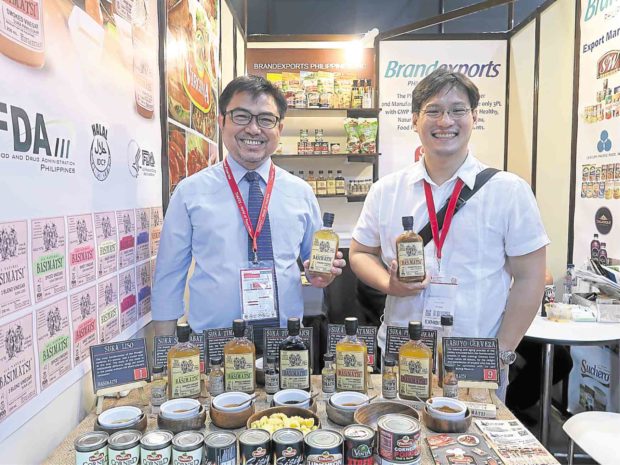Pinoy products win hearts in Asia’s largest food expo
Some $22 million in four days. That’s the gross projected sales that 22 Filipino exhibitors bagged at Thaifex World of Food Asia last year, according to Roberto “Bobby” Amores, president of Philippine Food Processors and Exporters Organization, Inc. (Philfoodex). The company, in cooperation with the Department of Trade and Industry (DTI), brings Filipino companies to Thaifex, Asia’s biggest food expo held annually in Thailand.
The event ran from May 29 to June 2 this year and Amores is confident that the 24 exhibitors who participated will go home with projected sales of over $25 million.
The first hall that I visited when I arrived at Thaifex last Wednesday was, of course, the one where the Philippine booths were located. Our humble cluster of booths was located in Hall 7—there were 11 halls, each hall as big as the World Trade Center (yes, Thaifex is THAT big).
The booths of the Philippine companies were so simple compared to the elaborate and dramatic booths of other countries that I was so surprised to find out from Amores that the simple setup would generate that big an amount.
“On our first day, there was already a sale of $5 million,” Amores stressed. “Banana chips alone will have total sales of about $3 million for this event,” he added as we guided me to other halls.
This is why Thaifex is such a gem. It’s also why Anthony Rivera, assistant director of the Export Marketing Bureau of the DTI, encourages more companies to participate.
“DTI can help you become international,” he said, emphasizing the government can offer substantive assistance to companies that are not only interested but also committed.
“Inclusive growth is part of nation-building,” he explained, so DTI has various programs to help all kinds of companies grow, from startups or micropreneurs to those who would like to expand domestically and those who are ready to go international.
“We have programs where we actually ‘hand-hold’ companies, guide them, give them platforms and show them opportunities to help them grow.”
One that caught my eye was a vinegar brand called Basimatsi. It was a brand that I had never seen in Manila before. They had on display seven varieties or mixes of suka: Suka Liso, which is made of three kinds of vinegar—cane, palm and coconut; Suka Timplado, which adds various secret Pinoy spices; Suka Minatamis; Suka Sinalabat with ginger; Suka Pinausukan, which is best for barbecued meals; Suka Toyomansi; and Labuyo Cerveza, which has siling labuyo. The company behind the vinegar line, Kitchen Witchery, only started in 2015, but they have been meeting, maybe even exceeding, their sales targets, thanks in large part to the help of the Department of Agriculture, which through then Undersecretary Bernadette Romulo-Puyat, encouraged them to join Madrid Fusion Manila last year, and PhilFoodEx, which urged them to join Thaifex this year. They have already met some buyers at this week’s Thaifex and this will soon convert to actual sales.
Matthias Kuepper, managing director of Koelnmesse, said this was one of the strengths of their food exhibitions: “We have a buyers program wherein we bring in select key buyers from all over the world—from South America, the US, Europe, Dubai—who come to Thaifex to source from Southeast Asia.” Koelnmesse, the world leader in food exhibitions and organizer of Thaifex, goes as far as hosting these buyers so that the exhibitors are given the opportunity to meet them, an opportunity they might ordinarily have a difficult time finding elsewhere.
“It’s a two-way street,” Kuepper said. Or a win-win solution, as Koelnmesse creates this platform, this incredible marketplace, year after year, providing opportunities for both buyers and sellers ready to compete in the global arena.
“Some companies were very small when they started joining us. Then they would come every year and we have seen them grow throughout the years but they still participate,” he shared. “They see the market potential and they trust us as organizers.”
And it’s not only traders or corporations who benefit. Indigenous communities, farmers, chefs, even baristas are given an opportunity to shine and grow.
Adrian Lumaban of Yardstick participated in the Celebrity Barista section of Thaifex, alongside top baristas from other countries. “I learned a lot from them, on the trends in making coffee and I was also able to tell them about our own coffees,” he shared. Upon coming back, he said he would encourage his boss to host a talk so that he can share with other baristas what he learned at Thaifex.
The Philippine Coffee Board was also adequately represented, led by no less than Chit Juan. Joining her was Manny Torrejon and Commune’s Ros Juan.
A live coffee cupping session hosted by the Asean Coffee Board had expert coffee connoisseurs rating coffees from Indonesia, Myanmar, Malaysia, Thailand and the Philippines, giving Philippine beans grown by our farmers from indigenous communities in the provinces an opportunity to be discovered by traders from around the world.
This year, Thaifex had 2,537 exhibitors with participants from 41 countries filling up the 11 halls at the Impact Convention Center of Thailand. It was so overwhelmingly huge, with foot traffic estimated at a whopping 60,000 people.
Koelnmesse organizers said they hoped there would be more participation from the Philippines in the next expo. Well, with gross sales in the millions of dollars realized by the companies that have joined thus far, I think we can assure Kuepper of greater participation from the Philippines in the coming years.

